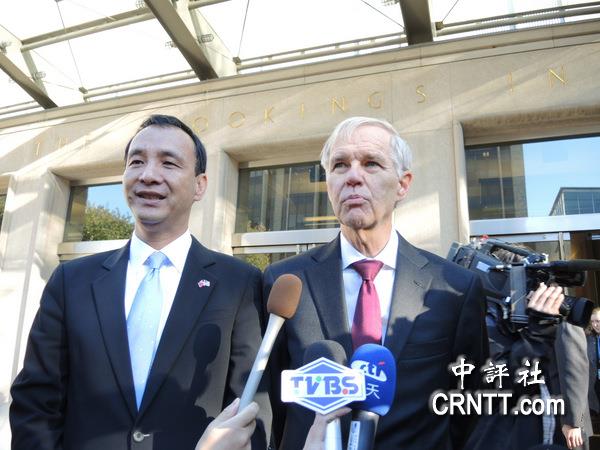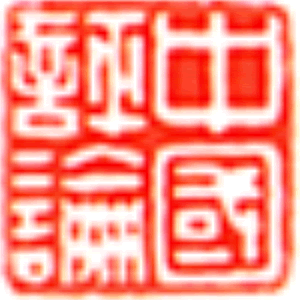
|
| 朱立伦在美国智库布鲁金斯研究院演说,指民进党不可能和大陆展开新的一页。(中评社 黄筱筠摄) |
中评社华盛顿11月13日电(记者 黄筱筠)中国国民党主席、“总统”参选人朱立伦上午约9点5分抵达华府重要智库布鲁金斯研究院,随即在东亚研究中心主任卜睿哲陪同下进行演说,朱立伦用英文演讲,几乎照稿演说,并未脱稿。朱立伦强调,海峡两岸能维持现状主要是马英九的成就,他是国民党“总统”参选人当然会持续维持现状,相对蔡英文的维持现状,难道代表殊途同归?难不成民进党终于打算与中国大陆开展全新的一页?他的答案是,几乎不可能。
朱立伦也强调,国民党与民进党最大不同在于,民进党总是以一厢情愿的态度面对两岸关系。民进党提出政策目标“维持现状”,很容易得到人民掌声,但问题是民进党老是避谈可行方案。朱立伦在演讲时亲切称呼与会人士“我的好朋友”。
以下为演讲中英全文:
今天,不但是布鲁金斯研究院的学术养分吸引我来此,也是我本人、本党(国民党)、反对党 (民进党),以及所有台湾人民数十年与贵院建立的友谊把我带来这里。我们对美国支持台湾的民主表达诚挚感谢。
各位是研究中国外交政策与台海关系的翘楚,清楚了解台湾海峡的和平与稳定符合台湾、中国大陆、与美国三边的利益。其中任何一方的误判,将可能严重损害美中台三边脆弱的利益平衡。
因此,六月三日民进党党主席蔡英文于美国智库战略与国际研究中心(CSIS)演讲中,谈到她 “已表达并多次重申对维持现状的立场” ,同时,她 “将在“中华民国”现行宪政体制下,依循普遍民意,持续推动两岸关系的和平稳定发展。” 然而 海峡两岸之所以能 “维持现状”,是马英九的成就。我作为国民党的“总统”候选人,一定会持续维持现状。所以,这代表殊途同归? 毕竟,台湾过去两年来经历许多挑战(例如太阳花运动,与民进党在“立院”无数次地阻挠议事)。难不成民进党终于打算与中国大陆开展全新的一页? 我的答案是:“几乎不可能”。
民进党在处理两岸事务与国民党最大的不同在于,民进党总是以一厢情愿的态度面对两岸关系。民进党提出政策目标“维持现状”,很容易得到人民掌声,但问题是民进党老是避谈可行方案。国民党对待两岸关系则采务实政策,你必须考量对手对你的态度,你要制定怎样的政策架构,你应该要释出或期待接受什么样的讯息,最后,如何在这样棘手处境中,与一个崛起中的大国交手。马英九设计了一个机制以维持现状,这点做得非常好。但两岸关系错综复杂,经纬万端,好的政策也会有意想不到的结果。如果我有幸当上“总统”,我将更进一步补足现行政策,我要培养“国内”的政治基础,用以支持这个“国家”大战略,以确保海峡两岸的和平与稳定。
在与在座学者交换意见前,容我提出我的两岸政策轮廓:
台湾需要持续现行的政策架构,与中国大陆继续和解,才能够维持现状。台湾必须加强对中国大陆的了解,在每次接触中,评估中国大陆对台湾的意图。与美国密切合作,但台湾必须避免让美国陷入不必要的台海纷争中。台湾人民必须成为负责任的利害攸关者, 必须负责地、严肃地思考“国家安全”问题。台湾必须更加开放其贸易体制,使企业在大陆、在国际市场更具竞争力。
为了达到上述目标,制度性改革是必要的。
我先讲到这里,等会儿将和各位学者专家继续深度交换意见。谢谢大家。
It gives me great pleasure to be in this institution, a bulwark in American democracy that knows the science of public policies and the art of speaking truth to power. And it is not just the academic appeal of the Brookings Institution that brings me here, it is also the friendship I, my party the KMT, the opposition party DPP, and, indeed, all Taiwan people have enjoyed for decades that led me here. We are thankful of American’s support for Taiwan’s democracy.
As top experts in Chinese foreign policy and cross-strait relations, you can see that peace and stability in the Taiwan Strait is in the national interests of Taiwan, Mainland China, and the United States. Any misstep by any party in the triangular relationship can seriously damage the delicate balance of interests across the Taiwan Strait.
Therefore, on June 3, DPP Chairwoman Tsai revealed in a speech at the Center for Strategic and International Studies that she has “articulated and reiterated [her] position of maintaining the status quo”…and that she “will push for the peaceful and stable development of cross-strait relations in accordance with the will of the Taiwanese people and the existing ROC constitutional order.” The “status quo” in the Taiwan Strait, however, is a major achievement of President Ma. And as the presidential candidate of the KMT, I most certainly will maintain the status quo. So, does this mean that “the more things change, the more they stay the same?” After all, Taiwan has undergone many difficulties (e.g., the Sunflower Student Movement, and the DPP’s numerous obstructions of the legislative deliberation process) over the past two years. Has the DPP finally turned a new page in its dealing with Mainland China? My answer is “Hardly.”
There is a major difference between the DPP’s treatment of cross-strait relations and the KMT’s. The DPP engages in wishful thinking vis-à-vis cross-strait relations. The DPP offers a policy goal, i.e., maintaining the status quo, which people agree upon, but the DPP shirks the responsibility of providing a workable formula to achieve that goal. The KMT treats cross-strait relations as a “substantive policy”, that is, you need to gauge how other parties think of you, what kind of policy framework you should lay down, what signals you should send and expect to receive, and, ultimately, how you walk the tightrope in dealing with a rising great power. President Ma has done an excellent job in designing an architecture that created and helps maintain the current status quo. But he did neglect one aspect about the complicated and complex nature of cross-strait relations. If elected president, I will make up for what he left out—cultivating a domestic base for a grand strategy that can secure peace and stability in the Taiwan Strait.
Before I start discussions with the distinguished scholars present here, let me draw a rough outline of my cross-strait policy:
Taiwan needs to continue its current policy framework to pursue rapprochement with China so as to make the status quo work;
Taiwan must strengthen its understanding of China and incorporate a realistic assessment of China’s intentions toward Taiwan in every round of encounters;
While working closely with the United States, Taiwan must not entrap the United States in any unnecessary entanglements in the Taiwan Strait;
For Taiwan to be a responsible stakeholder, Taiwan people must think responsibly and seriously about its national security;
Taiwan must further liberalize its trade regime to make its businesses more competitive in the world market. And,
To achieve the above, institutional reforms will be needed.
That is the end of my remarks for now. Thank you. |
